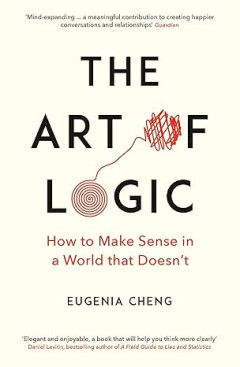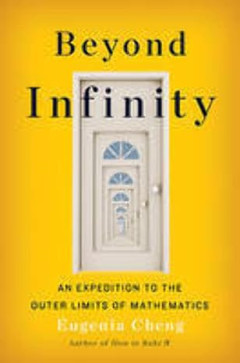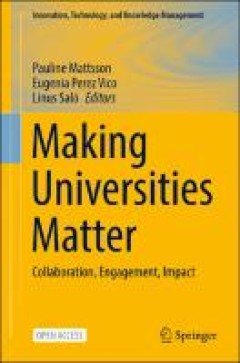Ditapis dengan

E-book The Art of Logic: How to Make Sense in a World that Doesn't
For thousands of years, mathematicians have used the timeless art of logic to see the world more clearly. In The Art of Logic, Royal Society Science Book Prize nominee Eugenia Cheng shows how anyone can think like a mathematician - and see, argue and think better. Learn how to simplify complex decisions without over-simplifying them. Discover the power of analogies and the dangers of false e…
- Edisi
- -
- ISBN/ISSN
- 9781788160391
- Deskripsi Fisik
- 277 halaman, ilus.
- Judul Seri
- -
- No. Panggil
- 510.1 CHE t

E-book Beyond Infinity: An Expedition to the Outer Limits of Mathematics
"[Cheng] does a great service by showing us non-mathematician schlubs how real mathematical creativity works." -- Wall Street Journal How big is the universe? How many numbers are there? And is infinity + 1 is the same as 1 + infinity? Such questions occur to young children and our greatest minds. And they are all the same question: What is infinity? In Beyond Infinity, Eugenia Cheng takes u…
- Edisi
- -
- ISBN/ISSN
- 9780465094813
- Deskripsi Fisik
- 282 halaman, ilus.
- Judul Seri
- -
- No. Panggil
- 519.8 CHE b
E-book Black Dragon : Afro Asian Performance and the Martial Arts Imagination
In August 1969, a group of local Japanese martial arts masters in New York invited Ronald Duncan, a burgeoning Black1 American practitioner of the Japanese martial art of ninjutsu, commonly translated as the “art of stealth,” to exhibit his techniques as part of the second International Convention of Martial Arts hosted by Black Belt mag…
- Edisi
- -
- ISBN/ISSN
- 9780814214602
- Deskripsi Fisik
- 239 hlm
- Judul Seri
- -
- No. Panggil
- 791.43 PRI b
E-book Critical Theory: A Very Short Introduction
Critical theory emerged in the 1920s from the work of the Frankfurt School, the circle of German-Jewish academics who sought to diagnose—and, if at all possible, cure—the ills of society, particularly fascism and capitalism. In this book, Stephen Eric Bronner provides sketches of leading representatives of the critical tradition (such as George Lukács and Ernst Bloch, Theodor Adorno and Wa…
- Edisi
- -
- ISBN/ISSN
- 9780199730070
- Deskripsi Fisik
- 145 halaman
- Judul Seri
- -
- No. Panggil
- 301 BRO c

E-book Tutankhamun: Egypt's Most Famous Pharaoh
- Edisi
- -
- ISBN/ISSN
- 9781842432402
- Deskripsi Fisik
- 160 halaman, illus.
- Judul Seri
- -
- No. Panggil
- 932 PRI t
- Edisi
- -
- ISBN/ISSN
- 9781842432402
- Deskripsi Fisik
- 160 halaman, illus.
- Judul Seri
- -
- No. Panggil
- 932 PRI t

E-Book Making Universities Matter: Collaboration, Engagement, Impact
In an era of rapid change and increasing societal demands, the role of universities as knowledge producers and catalysts for change has come under scrutiny. This open access book offers a fresh perspective on the significance of universities in society, shedding light on how their knowledge can truly matter beyond academia. Drawing upon insightful inquiries from both the Swedish and internation…
- Edisi
- -
- ISBN/ISSN
- 9783031487996
- Deskripsi Fisik
- 232 halaman
- Judul Seri
- -
- No. Panggil
- 378 MAT m
E-book Barack Obama : A Biography
In the United States, many political leaders throughout history have come from powerful families. For Barack Obama, this is far from the truth. His upbringing was in humble circumstances, and, while he doesn’t fit any typical political mold, he is already considered by many to be one of the most dynamic figures in U.S. politics. His oratory skills, direct style, and ability to communicate are…
- Edisi
- -
- ISBN/ISSN
- -
- Deskripsi Fisik
- 166 hlm
- Judul Seri
- -
- No. Panggil
- 923.1 PRI b
E-book Communicating Linguistics Language, Community and Public Engagement
In his 1980 book Language: The Loaded Weapon, Dwight Bolinger decries the number of ‘shamans,’ as he calls them, who comment without authority (and usually without recourse to evidence) on the use of language. The problem, he says, is that ‘they are almost the only people who make the news when language begins to cause trouble, and someone must answer the …
- Edisi
- -
- ISBN/ISSN
- 9781003096078
- Deskripsi Fisik
- 265 hlm
- Judul Seri
- -
- No. Panggil
- 410 PRI c

WANITA YANG DIKENDALIKAN KRISTUS
- Edisi
- cet. 1
- ISBN/ISSN
- 979-415-303-6
- Deskripsi Fisik
- 314 hlm;;11 x 18 cm
- Judul Seri
- -
- No. Panggil
- 248 PRI w
- Edisi
- cet. 1
- ISBN/ISSN
- 979-415-303-6
- Deskripsi Fisik
- 314 hlm;;11 x 18 cm
- Judul Seri
- -
- No. Panggil
- 248 PRI w
 Karya Umum
Karya Umum  Filsafat
Filsafat  Agama
Agama  Ilmu-ilmu Sosial
Ilmu-ilmu Sosial  Bahasa
Bahasa  Ilmu-ilmu Murni
Ilmu-ilmu Murni  Ilmu-ilmu Terapan
Ilmu-ilmu Terapan  Kesenian, Hiburan, dan Olahraga
Kesenian, Hiburan, dan Olahraga  Kesusastraan
Kesusastraan  Geografi dan Sejarah
Geografi dan Sejarah